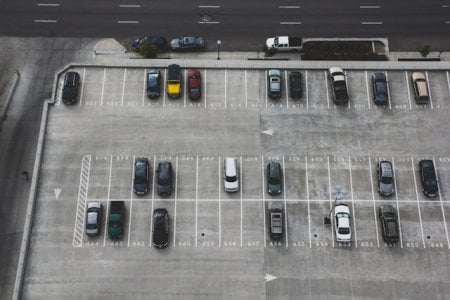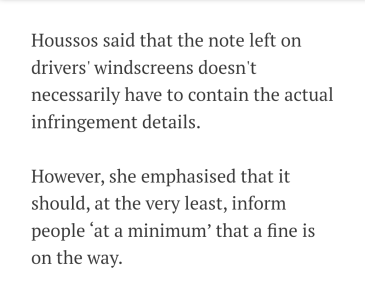Hate parking headaches? State government axes controversial parking measure
By
Seia Ibanez
- Replies 27
Navigating the ins and outs of parking regulations is often a source of frustration for many drivers.
Still, there's good news on the horizon for those who have been at odds with one of the country's parking enforcement tactics.
New South Wales has decided to scrap the contentious ticketless parking system, reinstating the traditional paper tickets that offer immediate notification of fines.
In a controversial move made in May 2020, the NSW government trialled the ticketless system in parking.
This system empowered parking officers to issue infringements without slapping a ticket on the driver's windscreen, making it an unwelcome surprise in the mail weeks later.
This ticketless system, although proven lucrative for the government, has been a source of widespread frustration among motorists.
Not finding a ticket on the windscreen instantly stripped away any chance of the driver documenting the scene or gathering evidence in case they wanted to dispute the fine.
In response to the public sentiment, NSW Finance Minister Courtney Houssos made a decisive shift.
In a letter to the councils across the state, the Minister ordered an immediate stop to the ticketless system and called for the reintroduction of traditional paper tickets when issuing parking fines.
The Minister also barred any future councils from employing this system.
'Providing immediate notification to drivers is the right thing to do and is an important first step to restoring community trust in the administration of the fines system,' Houssos wrote.
'This could be as simple as a note, which could take the form of a standardised pre-printed card, noting that a fine has been issued. Doing so will allow drivers to take their own photos and note down relevant details.'
Houssos said that the note left on drivers' windscreens doesn't necessarily have to contain the actual infringement details.
However, she emphasised that it should, at the very least, inform people ‘at a minimum’ that a fine is on the way.
Revenue NSW's findings indicate that ticketless fines have generated significant profits for the government.
In 2023, councils across the state amassed $236 million through this system, representing a substantial increase from the pre-ticketless era.
Nearly $140 million was garnered from the issuance of 749,000 ticketless fines.
Comparatively, before the trial phase of ticketless fines, councils only collected $198 million in revenue from parking fines in 2018.
Peter Khoury from the National Roads and Motorists' Association (NRMA), a vocal critic of the ticketless system, stated, ‘If motorists only learn they have been fined weeks later, it takes away the transparency of the scheme and stops motorists from getting their own evidence.’
'It is also not a deterrent. If you park at the beach and you see parking fines on people's windscreens, it reminds people that parking officers are about and to do the right thing.'
Changes in road regulations may also lead to confusion and miscommunication.
In a previous story, state police discovered that motorists were unaware of the recent reduction in speed limit, leading to the withdrawal of fines issued to drivers. You can read more about the story here.

What do you think of removing the ticketless system? Let us know your thoughts in the comments below!
Still, there's good news on the horizon for those who have been at odds with one of the country's parking enforcement tactics.
New South Wales has decided to scrap the contentious ticketless parking system, reinstating the traditional paper tickets that offer immediate notification of fines.
In a controversial move made in May 2020, the NSW government trialled the ticketless system in parking.
This system empowered parking officers to issue infringements without slapping a ticket on the driver's windscreen, making it an unwelcome surprise in the mail weeks later.
This ticketless system, although proven lucrative for the government, has been a source of widespread frustration among motorists.
Not finding a ticket on the windscreen instantly stripped away any chance of the driver documenting the scene or gathering evidence in case they wanted to dispute the fine.
In response to the public sentiment, NSW Finance Minister Courtney Houssos made a decisive shift.
In a letter to the councils across the state, the Minister ordered an immediate stop to the ticketless system and called for the reintroduction of traditional paper tickets when issuing parking fines.
The Minister also barred any future councils from employing this system.
'Providing immediate notification to drivers is the right thing to do and is an important first step to restoring community trust in the administration of the fines system,' Houssos wrote.
'This could be as simple as a note, which could take the form of a standardised pre-printed card, noting that a fine has been issued. Doing so will allow drivers to take their own photos and note down relevant details.'
Houssos said that the note left on drivers' windscreens doesn't necessarily have to contain the actual infringement details.
However, she emphasised that it should, at the very least, inform people ‘at a minimum’ that a fine is on the way.
Revenue NSW's findings indicate that ticketless fines have generated significant profits for the government.
In 2023, councils across the state amassed $236 million through this system, representing a substantial increase from the pre-ticketless era.
Nearly $140 million was garnered from the issuance of 749,000 ticketless fines.
Comparatively, before the trial phase of ticketless fines, councils only collected $198 million in revenue from parking fines in 2018.
Peter Khoury from the National Roads and Motorists' Association (NRMA), a vocal critic of the ticketless system, stated, ‘If motorists only learn they have been fined weeks later, it takes away the transparency of the scheme and stops motorists from getting their own evidence.’
'It is also not a deterrent. If you park at the beach and you see parking fines on people's windscreens, it reminds people that parking officers are about and to do the right thing.'
Changes in road regulations may also lead to confusion and miscommunication.
In a previous story, state police discovered that motorists were unaware of the recent reduction in speed limit, leading to the withdrawal of fines issued to drivers. You can read more about the story here.
Key Takeaways
- Ticketless parking infringements in New South Wales (NSW) have been scrapped due to public disapproval.
- NSW Finance Minister Courtney Houssos ordered councils to revert to using paper tickets for parking fines to restore community trust.
- The reintroduction of paper tickets will allow drivers to gather evidence if they wish to challenge a fine.
- Revenue from ticketless fines was significantly higher than from traditional fines, with NSW councils collecting $236 million in 2023 through the scheme.









